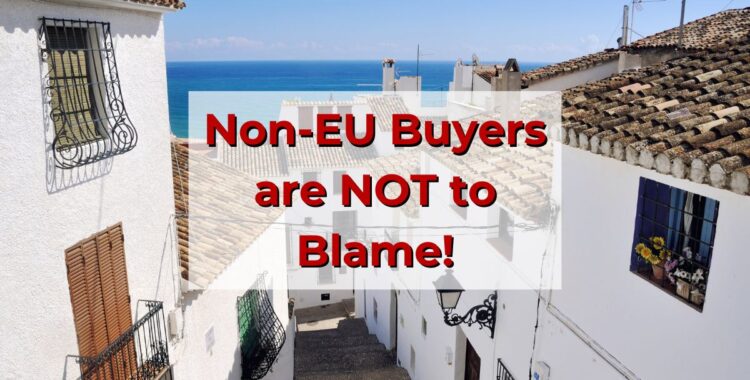Is Spain’s housing crisis on non-EU buyers?
Is the blame for Spain's housing crisis truly on non-EU property buyers?
The Spanish Prime Minister has attempted to rationalize imposing taxes or even prohibiting non-EU non-residents from acquiring properties in Spain, claiming their intent is “to speculate.” However, statistics suggest that there are more significant factors at play in Spain’s housing dilemma.
What effect would limiting property purchases by non-resident Brits, Americans, and other non-EU nationals really have on Spain’s real estate market? Could this measure genuinely aid average Spaniards by making more homes available and reducing prices?
In a speech on January 13th, Prime Minister Pedro Sánchez stated that 27,000 properties were bought by non-residents from outside the EU in 2023. Yet, there’s no concrete proof to back this figure. “(They bought homes) not to live in them, but primarily to speculate. To profit from them. This is something we cannot allow in our current housing shortage,” argued Sánchez.
A prominent real estate specialist notes that according to the Spanish Notaries’ Association, non-EU foreign buyers acquired 18,648 residential properties in Spain during 2023. This figure marks a seven percent decrease compared to the previous year.
The Association of Spanish Notaries supervises the signing of all property deeds across the nation, with a total of 623,000 deeds signed in 2023.
Their records show that non-EU citizens, both residents and non-residents, made up only 14 percent of all foreign property purchases in Spain during 2023.
Moreover, the 18,648 properties acquired by non-EU non-residents in 2023 constitute merely 3 percent of the overall property transactions in Spain for that year.
Would placing restrictions on this small group of third-country non-resident buyers really have a significant impact on the overall market?
Firstly, let’s examine the origins and purchasing habits of these non-EU, non-resident buyers.
According to data from the Spanish Notaries’ Association, during the first half of 2024, British nationals were the predominant buyers in this category, accounting for 37.9 percent (3,480 properties). Following them were Americans, who made 695 purchases. Ukrainians (489), Norwegians (480), and Swiss (416) were next, while Russian and Chinese buyers acquired 414 and 257 properties respectively.
Spanish Property Insights indicates that only British buyers are numerous enough to notably influence the market.
Although British nationals buy properties across Spain, they predominantly choose the coastal regions, especially the Costa Blanca in Valencia, the Costa del Sol in Andalusia, and Murcia. Statistics reveal that 90% of British purchasers opt for properties in Alicante, Málaga, coastal Murcia, the Balearic Islands, the Canary Islands, and Almería.
Indeed, statistics from CaixaBank reveal that Catalonia and Madrid, along with the city of Murcia, La Coruña and Vigo in Galicia, and Zaragoza in Aragón, are the regions facing the most significant housing shortages.
This suggests that prohibiting non-EU, non-resident purchasers such as the British may not impact the housing markets in the areas experiencing the highest demand.

Who else is contributing to the housing crisis in Spain?
The key issue is whether the implementation of restrictions and prohibitions will effectively curb the influence of large investment firms and vulture funds, which could have a significantly larger effect on the market compared to individual purchasers of holiday homes along the coast.
According to information from the Cadastro registry of the Ministry of Finance, there are over one million properties (1,046,188) in Spain owned by major corporations. Furthermore, there are 27,000 landlords in Spain who each possess more than twelve residential properties.
According to data from CBRE Group, major investment funds hold ownership of approximately 110,000 rental homes in Spain, constituting about five percent of the nation’s entire rental inventory. This figure exclusively represents rental homes, not the total properties owned by these funds.
For instance, the American investment heavyweight Blackstone is a predominant player in Spain’s property market, ranking as the second largest landlord in the country, only behind CaixaBank.
In recent years, tenants in Madrid’s Blackstone-owned apartments have experienced rent increases up to 60 percent, along with evictions for those unable to meet the new financial demands.
If the Spanish government were to restrict or prohibit large foreign investment firms from acquiring properties, it could significantly benefit the local community by preventing ongoing price hikes and the monopolization of available housing.
Let us know what you think, is it the fault of the NON-EU buyer or something else?











